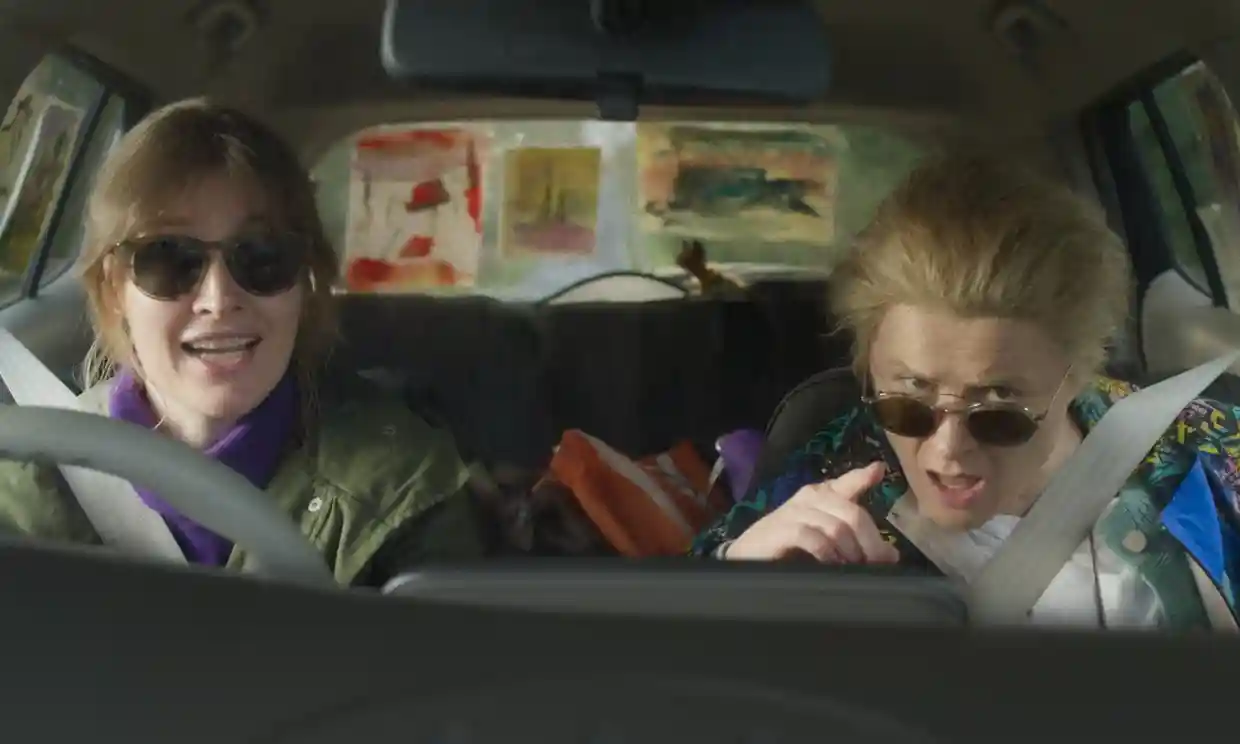
09 Mar Typist Artist Pirate King review – generous portrait of neglected artist Audrey Amiss
Carol Morley’s warm and sympathetic film imagines the artist, whose mental illness curtailed her ambitions, on a tragicomic road trip to exhibit her work
With natural sympathy and warmth, film-maker Carol Morleyhas created this likable, generous, imaginative response to the work of the neglected English artist Audrey Amiss, played here with beady-eyed gusto by Monica Dolan. And if the movie finally has a bit of a soft centre, then this is partly because of Morley’s refusal to fetishise the supposedly transfigurative pain of mental illness.
Sunderland-born Amiss trained as a painter at the Royal Academy in the 1950s, had a breakdown and was in and out of institutions for the rest of her life, finally taking a secretarial job but restlessly creating unsold and unseen art, in the form of raw impressionistic sketches of her daily existence and an autofictional collage-journal of found objects – packaging, flyers, leaflets – to which she added stream-of-consciousness diary entries, a continuously updated real-time manuscript record of a hidden life. It is held in an archive at the Wellcome Collection in London, which Morley was the first to examine (biographers will surely come later). She discovered Amiss’s passport with its scribbled entry under Occupation: “Typist Artist Pirate King”.
In some ways, this is like Morley’s 2011 documentary Dreams of a Life, which sought to reconstruct the life of a mysterious forgotten woman who left no direct testimony after her tragic death. Here, Morley has a huge amount of archive material to draw on, but has chosen instead to springboard an imagined narrative from just a few telling details: an old-fashioned road movie.
Dolan plays Amiss in a chaotic London flat, twitching and flinching with a kind of hypervigilant defiant unhappiness, always suspecting conspiracies against her, brooding over the past. Kelly Macdonald plays an imaginary social worker Sandra who comes once a fortnight to endure a nonstop barrage of abuse from Amiss. Cantankerous and impossible and entirely ungrateful, Amiss demands that Sandra drive her to a “local” art gallery advertised in the paper where she is sure she can finally get exhibited. Against her better judgment, Sandra agrees, with Audrey revealing no address but airily assuring Sandra that she will give directions. It is only after they have been on the road awhile that Audrey reveals she means “local” in the sense of local to where was born: they are driving to Sunderland for a great reckoning with her childhood and her sister Dorothy (Gina McKee). Sandra has no choice but to agree and to add insult to injury, Audrey nicknames her Sandra Panza.
https://www.youtube-nocookie.com/embed/L-lCtQNhh2k?wmode=opaque&feature=oembed From here, Audrey hallucinates and misinterprets almost everything that is presented to her senses, but never neglects to assemble it all in her bulging scrapbook. Without Dolan’s boisterous performance, and without the intelligent sensitivity of Macdonald to counterbalance it, this might have been less than the sum of its parts. The casting works with the writing and the black comic and tragicomic nature of their ordeal is often hilarious. Dolan’s Amiss is almost unbearable in her incessant gabbling: she never stops talking, never stops denouncing and self-justifying, no matter how much she disgraces herself in public. When she insists on driving for a while and naturally crashes into a tree, she rhapsodises into her deployed airbag about the artistic qualities of the tree and attacks Sandra for failing to appreciate it.
Like many road movies, perhaps, this is heading one way – towards epiphany and catharsis of the sort that Amiss perhaps never knew in her lifetime. But it is tremendously shot by Agnès Godard and the compassion of the film is palpable. Now we need a real exhibition of Amiss’s work.